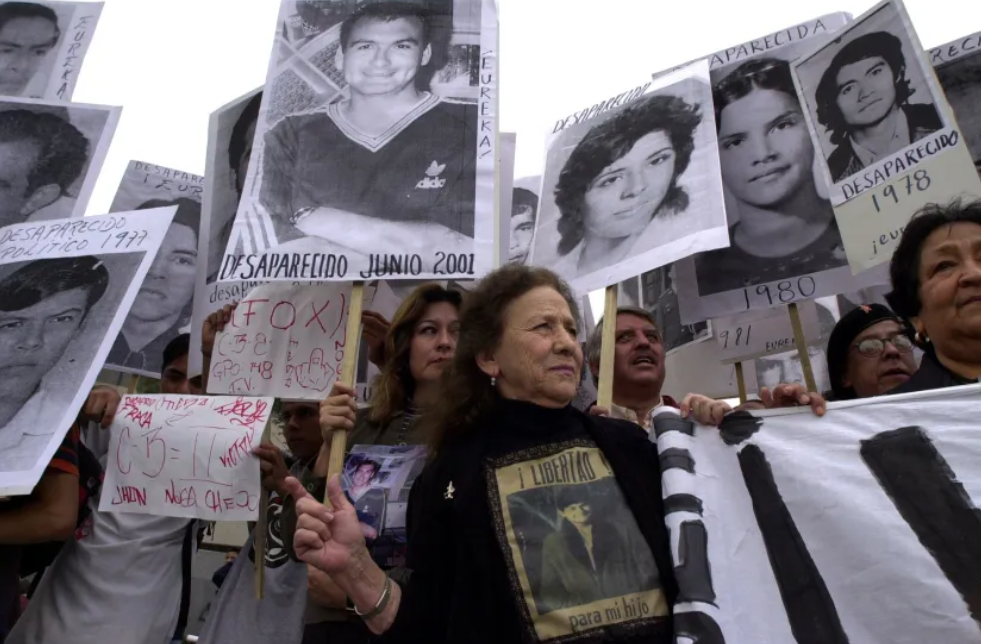
Jose Luis Magana / AP
by Hermann Bellinghausen
How many times, by the whims of language, a name becomes destiny. Rosario Ibarra de Piedra one day ceased to be just the mother of her children to become the symbolic mother and driving force of hundreds of mothers (and fathers) with disappeared children. Scapular and lay rosary, touchstone and rock foundation defending the right of a family to know where their son is; in her case, Jesus Piedra Ibarra, an idealistic boy who opted for the armed struggle and in 1975 was kidnapped by the State security services. In 1977, 45 years ago, involved in the search for Jesús, she founded the Eureka! Committee to summon the families who were looking for their young men, lost in the basements of the PRI power and the dirty and paranoid war of Diaz Ordaz -Echeverría regimes.
Doña Rosario, as we have called her for decades, embodied reason and love in the face of the shamelessness of the repressive State. A woman of great intelligence, she soon acquired a political conscience and a moral stature that she exercised responsibly and heroically. How could you not love her. Today, when everyone remembers her, their photographs, their common experiences, I will allow myself to document two separate encounters in time that portray her, in spite of her iconic mourning, as an enthusiastic lover of life.
It must have been around 1983, in Monterrey. By chance I had become the pet, pardon the expression, of a rebellious and left-wing millionaire, Irma Salinas Rocha (another pet of hers that I remember from back then is Felipe Ehrenberg). A close friend of Abraham Nuncio, and future shareholder of La Jornada, she was a writer of great notoriety for telling the murky secrets of Monterrey’s most powerful families. That year she had published her hilarious third book: Los Meros Meros: Manual of Conduct for Multi-millionaires. She was our spy among the rich. After the book launche we met at the house of a half-genius and quite crazy grandson of Alfonso Reyes to have a few drinks. Doña Rosario was invited.
Irma’s friend-enemy since her youth, a year before she had been the first woman candidate for the presidency of the Republic, for the Trotskyist party. It was a joyful meeting in which they reigned supreme. Already a bit tipsy, they began to argue with each other. The rich girl accused the middle class girl of being overly responsible (“she recited poems by heart”) that now, both in their fifties, stung a bit. They had been in the same room. They said many things to each other, to the delight of the guests. What I remember best is Irma acknowledging that Rosario was the prettiest, to which she replied, “Bah, at that age anyone is pretty.”
The second memory takes place in Spain, in 1997, together with our dear Paulina Fernández Christlieb. They were escorting the Tojolabal Zapatista comandantes Dalia and Felipe on their overland trip from Madrid to Barcelona and the Priory to Huesca in Aragon and then Andalusia, aboard a combi of the Spanish State for the Zapatista Committee. They were attending the second Intergalactic Encounter. At the public events, Doña Rosario read the messages of Subcomandante Marcos, to whom she had become very close.
Driving in the combi through the fields of Castilla, she decided to take the indigenous people to see the windmills of La Mancha “of which the Sup writes so much,” she told them. So they could tell him what the giants Don Quixote fought against are like. Dry and hot, that land opened up at the feet of the commanders. In Madrid, before delegates who spoke Italian, English, French, German, Arabic, Portuguese and Japanese, Felipe had said, “We bring our history as a testimony of dignity and as an example of the strength of the weak.”
Doña Rosario put her heart and her story on the line for the compas at airports, customs, train terminals and police checkpoints. Just as she did in Chiapas since the armed uprising of 1994, where she took advantage of her parliamentary privilege to come and go as messenger of the Zapatistas, lending them her voice as she did with the insurgent sons of the past. With derision and fear, the federal army officers who dealt with her at the checkpoints in the Lacandon jungle called her the mother, since she claimed to be Marcos’ mother.
Few Mexican political figures have had the selfless dedication of Doña Rosario. It was not necessary to always agree with her to know that, with comrades like her, the struggle is alive and worthwhile. She knew how to be an ally of her best political rivals, such as Cuauhtémoc Cárdenas. Her later differences with the Zapatista Army of National Liberation did not prevent her from being with them. Her heart never left them. There are so many popular struggles that can say the same about her.
This piece was published in La Jornada on April 18th, 2022. https://www.jornada.com.mx/2022/04/18/opinion/a07a1cul English translation posted by Schools for Chiapas.
